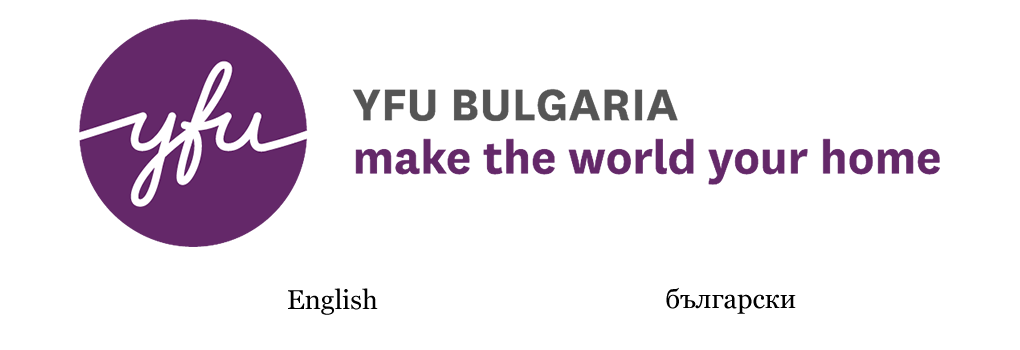Last year, in the middle of August, Suzi landed in Sofia, Bulgaria, to begin her one-year exchange experience. She was 15 when she took that plane. And now, several months later, we asked her to look back and tell us a bit about her experience. This is what she has to share with us!:
For me, this happens in Bulgaria. A small country in Europe, even in the European Union, but so different. 16 years of my life I spent in Germany, which is not so far from Bulgaria if you see it from a geographical point of view. As in for the culture, the people, the mentality and almost everything else, it's just so different. Sometimes, even the opposite.
So, to start from the beginning: It is the August 14th, 2015. In the middle of the night, my family and I are on the way to the airport, to say "Goodbye!", for almost one year. I decided to go, to change, to gain experiences – good ones and bad ones – to have fun, to learn a new culture and a new language.
The plane flies over Germany, Austria, Hungary, Romania and lands in Bulgaria. The whole time I couldn't realise what I was doing there. Why would I leave Germany for one year? My friends, my family, my whole life? Just to start a new one in another place. It seemed crazy, but also so unbelievable and interesting.
- Now I am at the point where I know why I did all that; what exchange really means. I know about its benefits, the sides that are difficult and, of course, I learnt about Bulgaria and now I would like to share these things. -
 |
| Ádám (our Hungarian exchange student) and Suzi during their Bulgarian course! |
But the real exchange started in the middle of September. A new family, for most of us a new city in Bulgaria, school, and that meant again a new environment. We already learnt, how the life in a host family is and how we should behave because we started to get to know the differences between the Bulgarian culture and the culture where we have been living our entire life before.
My year was supposed to take place in Blagoevgrad, a smaller city in south-western Bulgaria, but as everybody will tell you, sometimes there are unexpected things happening. Things that are not really cool, but you learn from them. And so it was for me. After one month I returned back to Sofia, leaving my new friends, my hobbies and my school because I just had bad luck with my host family views on some things in the world that made it impossible for me to live there. So I had to leave Blagoevgrad and I returned to Sofia. There were 1 or two days, where I was really sad, but my friends from Sofia helped me over this time.
 |
| The view from Suzi's house in Sofia! |
 |
| And another one, during sunset |
In the time I spent here I learnt to adapt to different situations, the Bulgarian culture and I learnt to speak the language of the country, that I can now call my home. But what's so different in Bulgaria and Germany? I am going to try to explain that, but it could be really hard since you have to experience all these things within a long time. To start with the mentality, I would say that the biggest difference is the fact that Bulgarians are so opened. You get to know a person and they start talking about anything from their life or just what they are thinking about, which makes it a lot easier to get to know many different people and to make friends. In Germany, I was used to getting to know other people a lot slower.
When you come to Bulgaria, you will always here the sentence "Има време!", which means "there is time!" Being some minutes late for meetings is no problem. Doing things only in the last moment is completely normal and no one will be mad at you for that. Also, if anything that you have done is not perfect, people are pleased with what you have done, which is a really great feeling. I once did the dishes and broke a glass. In Germany it would be a problem and most people would just see that you broke something, but not that you helped. Here my host dad just told me that it happens when you are doing something like that and that it is absolutely no problem. I really like that part of the mentality.
 |
| Suzi's martenitsas ♥ |
 |
| Suzi and Eva (our Danish exchange student) |
Exchange also gave me some other moments that will never ever be possible if I would have stayed in Germany. Or would you ever get an accent in your mother tongue without living abroad? Could you ever call two places far away from each other your "home" or two families YOUR families? How could it be possible to learn a language that you couldn't talk at all before within a year, without going to live somewhere else?
This year gave me the opportunity to get to know who I am. To question things that I always did the same way. To think about stereotypes, to tolerate all kind of people's characters, to adapt to a country that I had only known from my geography book in school. This year is like the ultimate opportunity in life!
Until my return to Germany, there is only a relatively small time left and I really want to enjoy being together with my family and friends here, because the time went by so fast and it will never come again!"
Suzi, thank you so much for sharing this with us. We know you'll have an amazing rest of the year!





















.png)
.jpg)
